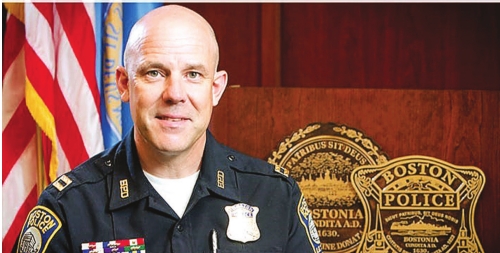
After only 11 months as commander of police districts overseeing Beacon Hill, Downtown and Charlestown, Captain Ciccolo has shown himself to be a man of action.
On June 1, just after Boston’s covid restrictions lifted, Ciccolo apprehended two men trespassing onto a construction site in the Theatre District. Last September, the captain chased down and arrested a man who attempted to sexually assault a woman in the Public Garden.
The captain was alerted to the most recent incident when a homeless man let him know two people had entered the construction site. Along with other officers, Ciccolo arrested the trespassers, who have been charged with felony counts of breaking and entering.
Ciccolo and the homeless
man had interacted before during the officer’s street outreach, a
program meant to connect homeless individuals with services.
“He
came up to me unsolicited to report something because we had a personal
relationship,” Ciccolo said. “That to me is exciting.”
Over
the past year, the quiet of the pandemic provided a chance to direct
more attention to individuals dealing with homelessness and mental
illness in his districts.
“Downtown
Boston with no sports and no bars is a different place than usual. It
gave me the opportunity to focus on some community issues that normally
have to compete for attention,” Ciccolo said, who has been on the Boston
police force for 38 years. The department works in partnership with St.
Francis House, Boston Healthcare for the Homeless and St. Anthony’s
Shrine.
“Getting folks in touch with those services helps them live a life with less police contact,” the Captain explained.
Now,
as Covid rates drop and the city re-opens, the local police force is
facing new challenges. “We’ve had 15 months where everything was
effectively closed. At this point almost everybody is new at their job,”
Ciccolo said. “We have an entire year cohort of 21-year-olds who got to
go out drinking in public all on the same day. People kind of must
re-learn behaviors.”
Ciccolo
and his department are working on educational outreach with restaurants
and bars, on topics like reducing overserving of alcohol, preventing
underage drinking, and diffusing potential conflicts. If management
staff are properly trained, the hope is that there will be no need to
call in officers. “The perfect way to make sure there’s not a problem
with the police is to have the police not be there at all,” Ciccolo
said.
DA-1 is piloting
another program that aims to reduce police contact with the public.
Under the new program, if a vehicle is parked in the wrong place, the
Department of Transportation will now be called first instead of the
police.
The past year
has focused heavily on policing in America. Amidst protests, former
Mayor Marty Walsh convened a Boston Police Reform Task Force and created
a new Office of Police Accountability and Transparency this January.
Acting Mayor Kim Janey has announced that the office will receive $1
million under her proposed budget.
The spotlight on policing has not only led to some reforms but has changed how young people think about it as a career.
“In today’s environment, simply encouraging young people to become a police officer can be a challenge,” Ciccolo said. .